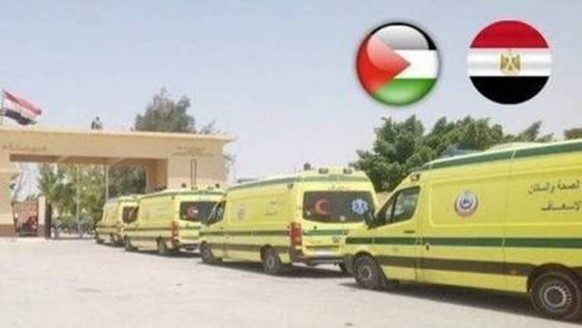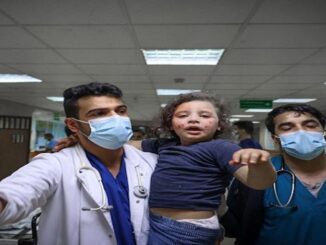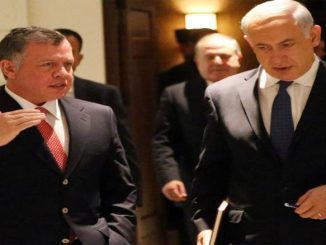
Only 12 Injured Palestinians out of 1600 have reportedly been taken through the Rafah crossing for treatment in Egypt so far.
Egyptian authorities on Sunday officially announced it would open the Rafah border crossing, which connects the Gaza Strip to Egypt’s Sinai to transfer wounded Palestinians, without giving details about how long it would remain open.
An official at the Gaza border said the opening was “exceptional” because it is usually closed during public holidays including Eid al-Fitr, this year running from Wednesday to Sunday in Egypt.
A Twitter activist called al-Rafeeky said Rafah Border Crossing between Egypt and Palestine (Gaza) was opened, with Palestinians beginning to enter safely.
The exceptional opening of the border is “an act of solidarity with the Palestinian people, who are suffering from the brutal Israeli aggression,” local outlets commented and explained that the decision comes a day after a dozen Egyptian ambulances entered the Gaza Strip to pick up Palestinians seriously injured.
The opening of the Rafah border crossing is essential for Gaza’s two million inhabitants as it is the only access that does not pass through Israel.
However, many social media activists have questioned the credibility of the Egyptian regime’s announcement of medically supporting the injured Palestinians and treating them in Egyptian hospitals.
Nadia El-Maged, a social media activist, tweeted saying:
“It is difficult to believe the Egyptian regime’s talk about supporting the Palestinians and their just cause, while it continues to blockade Gaza. Rami Shaath is still imprisoned and those who raise the Palestinian flag are arrested and selling the Palestinian flag is prevented in markets. In addition, only 12 of the 1630 injured Palestinians have been allowed to enter Egypt for treatment so far.”
According to Al-Ahram, a government-owned newspaper, Egypt has designated a total of 165 ambulances and 11 hospitals, including six in Greater Cairo, to treat Palestinians wounded in the ongoing Israeli assault on the Gaza Strip, which is entering its second week.
Meanwhile, a total of 1,800 doctors have volunteered to travel to Gaza and Sinai to help treat those injured in the assault on Gaza, Secretary-General of the Egyptian Doctors Syndicate Osama Abdel Hay said, adding, applications will remain open in case new needs arise, or in case doctors need to be redistributed to the Sinai hospitals receiving the wounded in coordination with the Health Ministry. The Doctors Syndicate issued a call for volunteers on Friday.
Also, vehicles carrying aid provisions also began to cross into Gaza last Monday, which has already received four vehicles carrying medical equipment from the Egyptian Red Crescent and 15 vehicles transporting fuel. Another 20 vehicles carrying fuel and 13 carrying food provisions are poised to cross the border, while travelers are permitted to cross at Rafah according to the normal criteria.
Seeking a regional role!
Some observers say that Egypt is seeking to restore its regional clout by mediating between Israel and Hamas to douse the former’s assault on Gaza that has cost more than 200 lives so far.
“Egypt has to be involved. There’s no way around it — literally and physically,” said Michael Hanna, a senior fellow at the New York-based Century Foundation.
Israel together with Egypt have enforced a land and sea blockade on Gaza since 2007, when Hamas seized control of the impoverished territory, home to about two million Palestinians, given that Rafah border crossing between Gaza and Egypt is the enclave’s only passage to the outside world not controlled by Israel.
Commenting on Sisi’s instruction to authorities last week to open the crossing to allow wounded Gazans to be treated in Egyptian hospitals and to deliver aid, Hanna said, “This is an opportunity to say not just to the US but to other regional parties that Egypt remains important, it’s a necessary diplomatic player and that a ceasefire is going to go through Cairo”.
He said Egyptian popular support for the Palestinians was one of the reasons for opening the Rafah crossing and announcing support for Palestinians.
It is noteworthy that Egyptian media had previously regularly branded Gaza a “terrorist hotbed” and demonizing Hamas.
If you are really pro-Palestine, free Ramy Shaath
If Egyptian regime is really pro-Palestine with respect to the current Israeli attack, then Free Ramy Shath, the Palestinian activist in Sisi’s prisons
For about 22 months now, Ramy Shaath, a well-known Palestinian-Egyptian activist and coordinator of the BDS movement; and Mohamed al-Masry, the BDS deputy coordinator, have been detained in a Cairo prison.
Egyptian authorities accuse Shaath and al-Masry of various terrorism-related offences. But Amnesty International and the United Nations say they are prisoners of conscience, as additional victims of the Egyptian government’s ongoing crackdown on dissent.
Shaath’s wife Céline Lebrun Shaath was able to visit him in jail for the first time about two months ago.
UN experts in March 2021 urged the Egyptian authorities to remove Ramy Shaath and other activists from a “terrorist” list and to stop the systemic misuse of counter-terrorism powers.
The UN experts called on authorities to implement the recent opinion of the Working Group on Arbitrary Detention finding that Mr. Shaath was arbitrarily detained, and he should thus be immediately released. The Working Group found that the proceedings placing Mr. Shaath on a terrorist list violated the presumption of innocence, in breach of article 14 (2) of the Covenant.
“We are deeply disturbed about counter-terrorism law, its definitions, misuse and the practice by the Egyptian authorities, and in particular the misuse of listing procedures at national level, to attack individuals engaged in human rights work,” the experts said. “The continued misuse of counter-terrorism powers is not consistent with the State’s international law obligations and undermines broader international efforts to prevent terrorism by misusing such powers domestically.”



